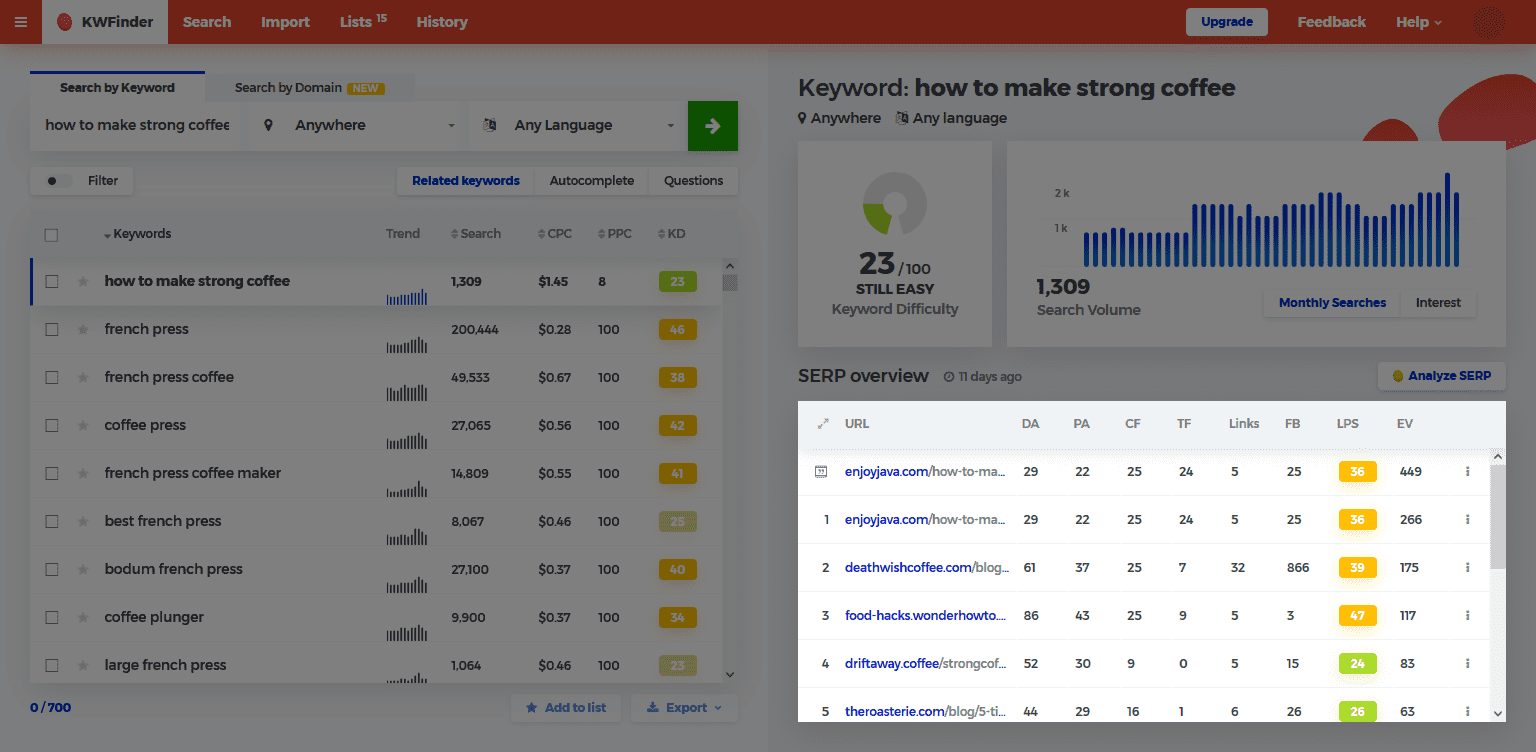Scan local SERPs for more than 50k locations
Are you sure that you are optimizing for relevant keywords and that you can outrank the competitors on the 1st SERP? Use KWFinder to find out.
1. Why is SERP analysis so important?
We all know that finding the right keyword is about achieving a good combination of the search volume and keyword difficulty. When you manage to do so, there is still one important part of the research to be done. And that’s the SERP analysis.
The analysis of search results is one of the most important parts of keyword optimization. Not only is it a final proof that you picked the right keyword but it gives you a lot of insights on competitors.
SERP analysis will help you to:
- Find out whether the keyword is relevant or not - reveal the search intent.
- Evaluate the competitors and your potential to outrank them.
2. Identify the Search intent
It's important to know what is the user's intent behind the search. This helps you to understand what type of content you should create.
For example, if somebody seaches for how to make homemade coffee, their intention is probably not to buy the coffe maker immediately (although they may want to buy one later on). So you don't want to rank with the ecommerce page selling the coffee maker.
However it's great opportunity to write an informative blog post and help the user in the decision process.
SERP analysis helps you to understand the search intent behind the keyword. Therefore, you will be able to identify keywords that seemed relevant at first, but at the end of the day, they may not be semantically correct.

Try KWFinder now
Get hundreds of keyword ideas with one click.
3. How to analyze competitors in SERP?
Your ability to outrank competitors in the 1st SERP is the key determiner for selecting the right keywords for your content. Before you start optimizing it, take a look at the most important SEO metrics we’ve included in the table:
- DA, PA (Domain Authority, Page Authority)
- CF, TF (Citation Flow, Trust Flow)
- Links (The number of external backlinks)
- FB (The number of Facebook shares)
- LPS (The Link Profile Strength)
- EV (The Estimated Visits per Month based on the CTR)
With these metrics, you get a clear view of the authority and popularity of the websites in the 1st SERP. The LPS is an aggregated metric that tells you how hard it is to compete with the URL on that particular position.
Quick tip:
Use SiteProfiler when you need to check the website authority and other key SEO metrics of any URL.
Let’s get back to the video: Our keyword “homemade coffee”, comes with solid search results. Most of the URLs have rather low metric values. There is a potential to outrank these sites depending on our SEO skills and efforts.

The greatest value of the SERP analysis in KWFinder is that each SERP is based on the selected location. When doing local SEO, select the location of your target audience.
There are more than 50,000 locations to choose from! You will see different search results for different locations and that’s exactly what you need for local SEO.
4. More SERPs, more metrics, deeper analysis
The Google SERP analysis table in KWFinder is basically a trimmed version of SERPChecker, one of the 5 SEO tools in the Mangools package.
Continue with an in-depth local SERP analysis by expanding the results from KWFinder. Click on the “Analyze SERP” right under the search results table.
You will find a lot of useful features in SERPChecker, such as Google features detection (answer boxes, featured snippets, Google Ads, carousels, etc.) and their impact on regular organic results, SERP snapshots for both desktop and mobile devices and 45+ SEO metrics.

Try KWFinder now
Get hundreds of keyword ideas with one click.